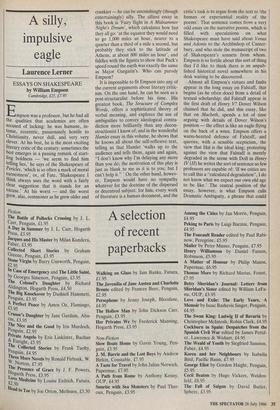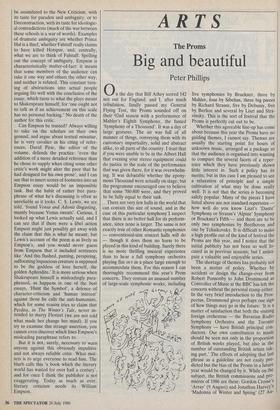A silly, impulsive eagle
Laurence Lerner
ESSAYS ON SHAKESPEARE by William Empson Cambridge, £25, £7.95 Empson was a professor, but he had all the qualities that academics are often accused of lacking: he was humane, in- tense, eccentric, passionately hostile to Christianity, never dull, and very very clever. At his best, he is the most exciting literary critic of the century: sometimes the best emerges in a passing remark of start- ling boldness - 'we seem to find him telling lies,' he says of the Shakespeare of Pericles, 'which is so often a mark of moral earnestness', or, of Fate, 'Shakespeare I think always uses the word with a fairly clear suggestion that it stands for an excuse.' At his worst - and the worst grew, alas, commoner as he grew older and crankier - he can be astonishingly (though entertainingly) silly. The silliest essay in this book is 'Fairy flight in A Midsummer Night's Dream', which calculates how fast they all go: 'at the equator they would need to go 1,000 miles an hour, nearer to a quarter than a third of a mile a second, but probably they stick to the latitude of Athens, at about 800 miles an hour', and fiddles with the figures to show that Puck's speed round the earth was exactly the same as Major Gargarin's. Who can parody Empson? It is impossible to fit Empson into any of the current arguments about literary critic- ism. On the one hand, he can be seen as a post-structuralist before his time. His greatest book, The Structure of Complex Words, offers a sophisticated theory of verbal meaning, and explores the use of ambiguities to convey ideological contra- diction more brilliantly than any decon- structionist I know of; and in the wonderful Hamlet essay in this volume, he shows that he knows all about the self-reflexive text, telling us that Hamlet 'walks up to the audience and tells them, again and again, "I don't know why I'm delaying any more than you do; the motivation of this play is just as blank to me as it is to you; but I can't help it." ' On the other hand, howev- er, Empson would have no sympathy whatever for the doctrine of the dispersed or decentred subject: for him, every work of literature is a human document, and the critic's task is to argue from the text to 'the human or experiential reality of the poems'. That sentence comes from a very odd essay on the narrative poems, which is filled with speculations on what Shakespeare must have said about Venus and Adonis to the Archbishop of Canter- bury, and who stole the manuscript of two of Shakespeare's sonnets from whom. Empson is so fertile about this sort of thing that I'd like to think there is an unpub- lished historical novel somewhere in his desk waiting to be discovered.
Almost all Empson's virtues and faults appear in the long essay on Falstaff, that begins (as he often does) from a detail of textual scholarship: did Falstaff appear in the first draft of Henry. V? Dover Wilson claimed that he did, and this essay, like that on Macbeth, spends a lot of time arguing with details of Dover Wilson's position - the effect is like an eagle flying on the back of a wren. Empson offers a warm-hearted defence of Falstaff, and queries, with a sensible scepticism, the view that Hal is the ideal king; protesting against the view that Falstaff is merely degraded in the scene with Doll in Henry IV (H) he writes the sort of sentence so few professors are capable of: 'If we critics are to call this a "calculated degradation", I do not know what we expect our own old age to be like.' The central position of the essay, however, is what Empson calls Dramatic Ambiguity, a phrase that could be assimilated to the New Criticism, with its taste for paradox and ambiguity, or to Deconstruction, with its taste for ideologic- al contradictions (much of the war between these schools is a war of words). Examples of dramatic ambiguity are whether Prince Hal is a thief, whether Falstaff really claims to have killed Hotspur, and, centrally, what we are to think of Falstaff. Spelling out the concept of ambiguity, Empson is characteristically matter-of-fact: it means that some members of the audience can take it one way and others the other way, and neither is refuted. This constant turn- ing of abstractions into actual people arguing fits well with the conclusion of the essay, which turns to what the plays meant to Shakespeare himself, for 'one ought not to talk as if an achievement on this scale has no personal backing.' No death of the author for this critic.
Can Empson be trusted? Always willing to take on the scholars on their own ground, and argue about textual minutiae, he is very cavalier in his citing of refer- ences. David Pirie, the editor of the volume, defends the practice: 'even the addition of a more detailed reference than he chose to supply when citing some other critic's work might alter the pace that he had designed for his own prose', and I can see that to insert scores of footnotes into an Empson essay would be an impossible task. But the habit of rather free para- phrase of what he's discussing is often as unreliable as it looks. C. S. Lewis, we are told, `found Venus and Adonis disgusting, mainly because Venus sweats'. Curious, I looked up what Lewis actually said, and I can see that if there were a libel action Empson might just possibly get away with the claim that this is what he meant; but Lewis's account of the poem is as lively as Empson's, and you would never guess from Empson that it included sentences like 'And this flushed, panting, perspiring, suffocating loquacious creature is supposed to be the goddess of love herself, the golden Aphrodite.' It is more serious when Shakespeare himself is misleadingly para- phrased, as happens in one of the best essays, 'Hunt the Symbol', a defence of character-criticism and 'human interest' against those he calls the anti-humanists, which for some reason tries to claim that Perdita, in The Winter's Tale, never in- tended to marry Florizel (we are not told what made her change her mind). If you try to examine this strange assertion, you cannot even discover which lines Empson's misleading paraphrase refers to.
But it is not, surely, necessary to warn anyone against this obviously impulsive and not always reliable critic. What mat- ters is to urge everyone to read him. The blurb calls this 'a book which the literary world has waited for over half a century', and for once I think the publisher is not exaggerating. Today as much as ever, literary criticism needs its William Empson.



















































 Previous page
Previous page